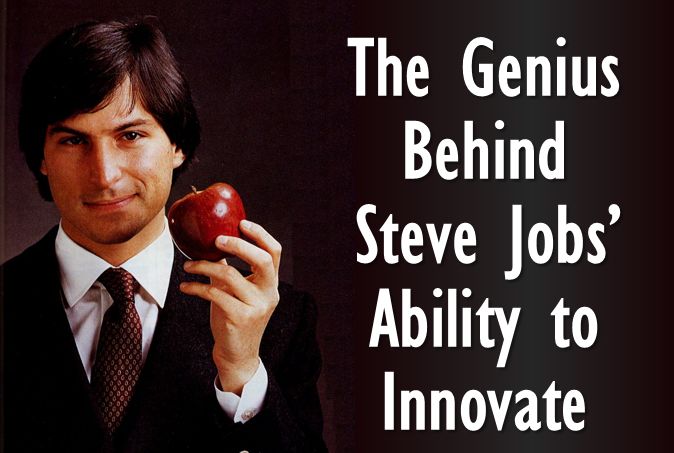Why was Steve Jobs such a Good Innovator?

Like I said in my last post, I am not a fan of Apple products. I have a Windows Phone, I love my Zune, and a month after I joined Rackspace I retuned my MacBook Pro to the IT department to get a Dell Windows 7 laptop. I have worked with Apple products for many years, I sold many Macs when I was in the digital imaging business in the early 90s and here are iPods, an iPhone and an iPad in our household.
Yet, as a marketer and a business man it would be foolish not to recognize the unique ability in Steve Jobs to transform industries: personal computers, music, cell phones, animated movies and publishing. Steve also had his share of failures : The Apple Lisa, hiring John Sculley, NeXT, Apple TV (so far), Ping FM, and others.
You have probable read a dozen ‘Leadership lessons from Steve Jobs’ articles, but I have a slightly different perspective that I want to share. These are the three reasons Steve had an incredible ability innovate, according to the Adaptive Marketer:
1. Steve clearly understood customer needs
Apple is famous for not doing traditional customer research . A few days ago Guy Kawasaki came to Rackspace and told a group of us at Rackspace “the day you see Apple doing a focus group is the day you must short your stock”. It is easy to come to the conclusion that Steve ignored customers creating customers on his own.
It is true Apple does not do customer focus groups, there is no feedback section on the website and after 5 years there is only one iPhone form factor despite customers who have asked for a physical keyboard, larger screens or a smaller, lower-cost version.
But there is a difference between not accepting direct customer feedback and not understanding customer needs. Steve was frustrated with the user experience in the first iTunes-enabled phone, the ROKR. Steve understood customer’s frustration with smart phones in general. He understood customer needs, and used his technology and user experience genius to create products that served those needs.
In fact, Steve Jobs’ first press quote, published in the July 1976 issue of Interface magazine read “If we can rap about their needs, feelings and motivations, we can respond appropriately by giving them what they want.” referring to his customers for the Apple I, hobbyists.
2. He understood it success is not a result of having the best technology, but in offering the best user experience.
This ability is especially important in the technology industry where most product managers, marketers and executives are fixated on the virtues of the latest technologies that we often miss or misunderstand customer needs. Steve was a geek at heart, but he also deeply understood the importance of customer experience.
Probably as important, he understood the power of simplicity. If you look at his product launch keynotes (and if you are a marketer you must), the message was concrete and simple to understand.
In 2005 when he launched the iPhone, he did not have slides with a hundred features, technologies and capabilities. Instead, the iPhone was presented as a phone, a music player and a browser: three concepts that everyone understood. He did not talk about how many megapixels in the camera, how many megahertz in the processor, or the details behind multi touch technology. It was simply a phone, a music player and a browser.
In terms of technology, there was nothing revolutionary in the iPhone. The Windows Mobile phones available in 2005 could do everything an iPhone could do. But Windows Mobile was not simple. The best technology does not always win. Otherwise we would all be using Amiga computers.
3. Steve was relentless in making his dreams a reality.
In a previous post, I summarized Marcus Buckingham’s perspective on leadership: Great leaders are restless for change, impatient for progress and deeply dissatisfied with the status quo. The possibility of a better future burns them and propels them. Great leaders see the future so vividly they have no choice but to do everything in their power to make this future real.
Steve really was an example of this. When the iPhone was announced, there was no market for $599 phones. There were only a handful of phones that were so expensive. If you worked at Motorola, for example, and proposed launching a $599 phone, the response would be that market research showed there were not enough buyers willing to pay so much for a phone, especially a phone that did nothing new.
“Apple iPhone will fail….The iPhone is nothing more than a luxury bauble that will appeal to a few gadget freaks. In terms of its impact on the industry, the iPhone is less relevant.” – said Mathew Lynn, from Blomberg in2007
Yet, Steve said Apple would sell 10 million phones in the first 18 months. And he did.
There was no market for iPads, either. Tablets had been available for years. Microsoft issued me a Toshiba tablet when I joined in 2004, which was interesting but I used mostly as a normal PC. When the iPad was launched people were confused about the use case. Why would anyone need one? Seemed like a cool toy for people with a couple hundred bucks laying around.
As my friend John Smolucha points out in a recent blog post: “Even more impressive, nearly 75% of Apple’s revenues come from just two products: the iPhone (53%) and the iPad (20%). The first iPhones began shipping in June 2007 and the iPad only became available a year ago, on April 3, 2010. I don’t know about you, but I’m not aware of any other company that generates nearly 75% of its revenue from products that didn’t exist five years ago, while doing it during a global economic downturn.”
Steve believed in his dreams beyond what rationality, beyond market research, beyond corporate practices and policies. He had a vision and worked tirelessly to make it a reality. Yes, he was a micromanager, but only because he was a perfectionist and did not accept any deviations from his dreams.
If you want to learn more about Steve, I recommend the Steve Jobs biography by Walter Isaacson.

